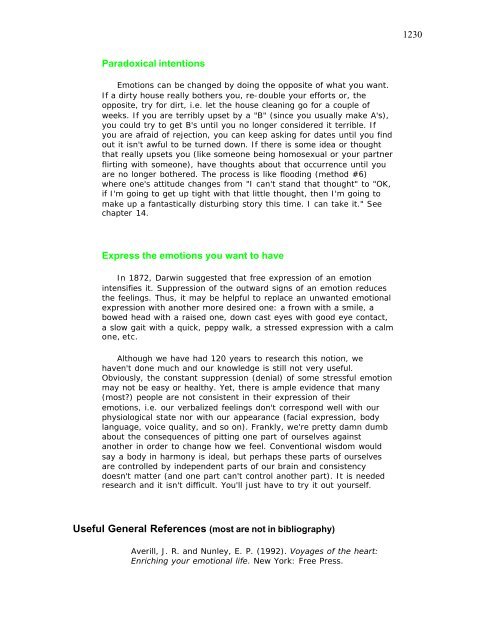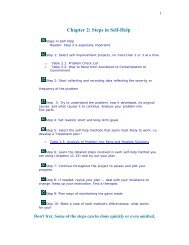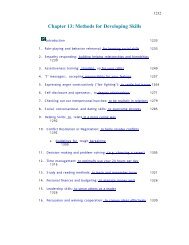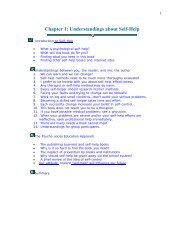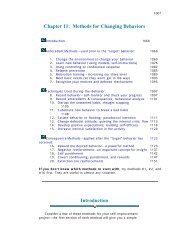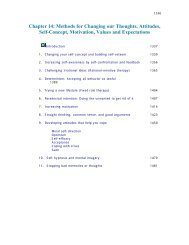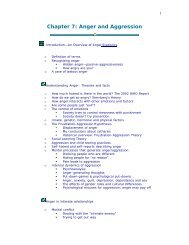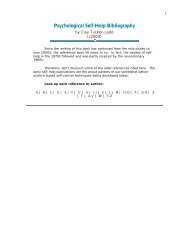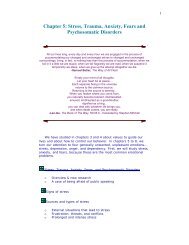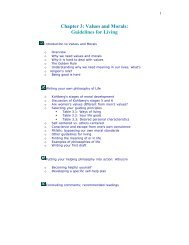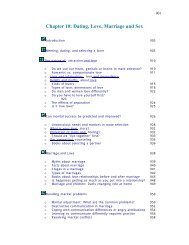Chapter 12: Methods for Changing Emotions - Psychological Self-Help
Chapter 12: Methods for Changing Emotions - Psychological Self-Help
Chapter 12: Methods for Changing Emotions - Psychological Self-Help
Create successful ePaper yourself
Turn your PDF publications into a flip-book with our unique Google optimized e-Paper software.
<strong>12</strong>30<br />
Paradoxical intentions<br />
<strong>Emotions</strong> can be changed by doing the opposite of what you want.<br />
If a dirty house really bothers you, re-double your ef<strong>for</strong>ts or, the<br />
opposite, try <strong>for</strong> dirt, i.e. let the house cleaning go <strong>for</strong> a couple of<br />
weeks. If you are terribly upset by a "B" (since you usually make A's),<br />
you could try to get B's until you no longer considered it terrible. If<br />
you are afraid of rejection, you can keep asking <strong>for</strong> dates until you find<br />
out it isn't awful to be turned down. If there is some idea or thought<br />
that really upsets you (like someone being homosexual or your partner<br />
flirting with someone), have thoughts about that occurrence until you<br />
are no longer bothered. The process is like flooding (method #6)<br />
where one's attitude changes from "I can't stand that thought" to "OK,<br />
if I'm going to get up tight with that little thought, then I'm going to<br />
make up a fantastically disturbing story this time. I can take it." See<br />
chapter 14.<br />
Express the emotions you want to have<br />
In 1872, Darwin suggested that free expression of an emotion<br />
intensifies it. Suppression of the outward signs of an emotion reduces<br />
the feelings. Thus, it may be helpful to replace an unwanted emotional<br />
expression with another more desired one: a frown with a smile, a<br />
bowed head with a raised one, down cast eyes with good eye contact,<br />
a slow gait with a quick, peppy walk, a stressed expression with a calm<br />
one, etc.<br />
Although we have had <strong>12</strong>0 years to research this notion, we<br />
haven't done much and our knowledge is still not very useful.<br />
Obviously, the constant suppression (denial) of some stressful emotion<br />
may not be easy or healthy. Yet, there is ample evidence that many<br />
(most?) people are not consistent in their expression of their<br />
emotions, i.e. our verbalized feelings don't correspond well with our<br />
physiological state nor with our appearance (facial expression, body<br />
language, voice quality, and so on). Frankly, we're pretty damn dumb<br />
about the consequences of pitting one part of ourselves against<br />
another in order to change how we feel. Conventional wisdom would<br />
say a body in harmony is ideal, but perhaps these parts of ourselves<br />
are controlled by independent parts of our brain and consistency<br />
doesn't matter (and one part can't control another part). It is needed<br />
research and it isn't difficult. You'll just have to try it out yourself.<br />
Useful General References (most are not in bibliography)<br />
Averill, J. R. and Nunley, E. P. (1992). Voyages of the heart:<br />
Enriching your emotional life. New York: Free Press.


